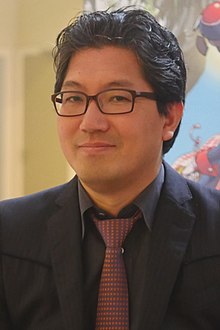Portal:Video games
The Video Games Portal

A video game or computer game is an electronic game that involves interaction with a user interface or input device (such as a joystick, controller, keyboard, or motion sensing device) to generate visual feedback from a display device, most commonly shown in a video format on a television set, computer monitor, flat-panel display or touchscreen on handheld devices, or a virtual reality headset. Most modern video games are audiovisual, with audio complement delivered through speakers or headphones, and sometimes also with other types of sensory feedback (e.g., haptic technology that provides tactile sensations). Some video games also allow microphone and webcam inputs for in-game chatting and livestreaming.
Video games are typically categorized according to their hardware platform, which traditionally includes arcade video games, console games, and computer (PC) games; the latter also encompasses LAN games, online games, and browser games. More recently, the video game industry has expanded onto mobile gaming through mobile devices (such as smartphones and tablet computers), virtual and augmented reality systems, and remote cloud gaming. Video games are also classified into a wide range of genres based on their style of gameplay and target audience. (Full article...)
Featured articles –
The game is played from a 2.5D, third-person perspective replicating the aesthetic of the television series. The New Kid is able to freely explore the town of South Park, interacting with characters and undertaking quests, and accessing new areas by progressing through the main story. By selecting one of four character archetypes, Fighter, Thief, Mage, or Jew, each offering specific abilities, the New Kid and a supporting party of characters use a variety of melee, ranged, and magical fart attacks to combat with their enemies.
Development began in 2009 after South Park creators Trey Parker and Matt Stone approached Obsidian about making a role-playing game designed to look exactly like the television series. Parker and Stone were involved throughout the game's production: they wrote its script, consulted on the design, and as in the television program, they voiced many of the characters. The Stick of Truth's production was turbulent; following the bankruptcy of the original publisher, THQ, the rights to the game were acquired by Ubisoft in early 2013, and its release date was postponed several times from its initial date in March 2013 to its eventual release in March 2014, for PlayStation 3, Windows, and Xbox 360. (Full article...)
The game was developed rather quickly as a sequel to the Nintendo 64 title Hey You, Pikachu! and to promote the Nintendo e-Reader accessory, and uses a novel 3D texturing effect. It was first showcased at Electronic Entertainment Expo (E3) 2003 and later through a month-long series of promotional events in Sapporo, Hokkaido, Japan. It was released on July 18, 2003, in Japan, December 1 in North America, and April 2, 2004, in Europe. In Japan, the game sold 66,373 copies in its first year. It received mixed reviews, which generally criticized its low level of interactivity and repetitive sound effects, though its collecting aspects and visuals were somewhat better received. (Full article...)

Accolade, Inc. (later Infogrames North America, Inc.) was an American video game developer and publisher based in San Jose, California. The company was founded as Accolade in 1984 by Alan Miller and Bob Whitehead, who had previously co-founded Activision in 1979. The company became known for numerous sports game series, including HardBall!, Jack Nicklaus and Test Drive.
By the early 1990s, Accolade saw critical acclaim for Star Control (1990), as well as strong sales for Bubsy (1993). However, Sega sued Accolade for creating unauthorized Sega Genesis games by reverse-engineering the console's boot-protection. Accolade won the case on appeal, overturning an injunction from the lower court that had interrupted their sales and development. The founders soon left the company. The new chief executive, Peter Harris, attracted new investment from Time Warner. The following year, Accolade president Jim Barrett replaced him. He focused on existing franchises hoping to secure the company's future. However, technical issues undermined the release of Bubsy 3D (1996), and Jack Nicklaus 5 (1997) was considered a commercial disappointment, despite positive reviews. The company still had modest successes with games such as Star Control 3 (1996) and Deadlock (1996), and saw strong sales for both Test Drive 4 (1997) and Test Drive: Off Road (1997).
The French firm Infogrames purchased Accolade in 1999 as part of its strategy to become more global, transforming it into a subsidiary called Infogrames North America. By 2000, it was consolidated into Infogrames, Inc. (the former GT Interactive), marking the end of Infogrames North America as a separate company and what remained of Accolade as an entity. In the years that followed, Infogrames purchased the Atari trademark and rebranded as Atari SA, before declaring bankruptcy in 2013 resulting in the sell-off of some assets. The Accolade assets were purchased by game publisher Tommo, who later resold them to Hong Kong-based holding company Billionsoft as part of a strategy to revive several classic games, however the assets that Billionsoft held were re-acquired by Atari SA in April 2023. (Full article...)
Did you know... -
- ... that 1980's Space Encounters video game was the first that Midway Games offered in their "mini myte" arcade game cabinet?
- ... that the Chicago Sun-Times credits JumpStart Toddlers as the first video game targeted towards babies?
- ... that Justin Yu, the current Classic Tetris World Champion, is also a cellist in MIT's video game orchestra?
- ... that the 1987 video game Oriental Hero was panned as "so incredibly bad it's almost worth a look"?
- ... that the concept of adding strippers to the extreme sports video game BMX XXX was initially proposed in jest?
- ... that Kainé from the video game series Nier was created in response to a female staff member's vague wish for a "male heroine"?
- ... that the 1979 video game Superman was one of the first console games with a pause feature?
- ... that Rockstar Vienna was the largest video game developer in Austria when it closed in 2006?
- ... that Splatoon 3 became the fastest-selling video game of all time in Japan three days after launch?
- ... that the developer of The Stillness of the Wind was inspired to make the video game after fantasizing with his girlfriend about raising goats instead of living in London?
- ... that when Kaz Ayabe pitched his video game Boku no Natsuyasumi to Sony, he said that illustrator Mineko Ueda was interested in the project even though they had never actually met?
- ... that the graffiti artists hired for the video game Skitchin' were interviewed at a train station because they were too young to drive?
Selected biography –
Selected image -
- April 16, 2024 – 2023–2024 video game industry layoffs
- American video game company Take-Two Interactive lays off 5% of its workforce. (Reuters)
- April 10, 2024 – 2023–2024 video game industry layoffs
- American video game company Epic Games announces that it will lay-off around 870 employees, roughly one-sixth of its workforce, due to slower growth than expected. (CBC via Yahoo! News)
- December 22, 2023 –
- China passes a series of regulations aimed at limiting video game microtransactions. The new rules include banning rewards for logging on for multiple consecutive days and banning rewards for players if they spend money in a game for the first time. (Reuters)
Topics
Categories
Things you can do
In other Wikimedia projects
The following Wikimedia Foundation sister projects provide more on this subject:
-
Commons
Free media repository -
Wikibooks
Free textbooks and manuals -
Wikidata
Free knowledge base -
Wikinews
Free-content news -
Wikiquote
Collection of quotations -
Wikisource
Free-content library -
Wikiversity
Free learning tools -
Wiktionary
Dictionary and thesaurus














































